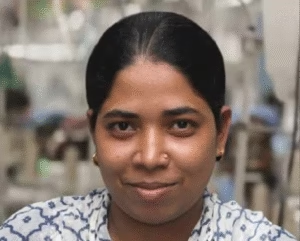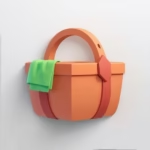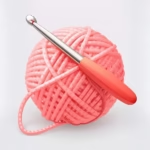Meet Rabeya Akter: From Struggle to Strength Through Sustainable Craftsmanship

Rabeya Akter, a talented and resilient woman artisan, is one of many hardworking producers at the Shuktara Handmade Paper Project, a fair trade production unit supported by Prokritee in Bangladesh. Her journey is one of hardship, hope, and empowerment, and it reflects the impact that fair trade and sustainable employment can have on women’s lives.
A Difficult Beginning
Rabeya was born into poverty in a large family. Her father, a farmer, often struggled to provide even the most basic necessities. “We didn’t have enough food,” she recalls, “and we had to share each other’s clothes. Buying new ones, even during festivals, was impossible.” Education was never an option for Rabeya or her siblings, and as the eldest daughter, she felt a deep responsibility to support her family.
As she grew older, Rabeya actively searched for work, but without any formal education or experience, doors remained closed. “No one would hire me because I didn’t have an education or work experience,” she said. It was during this time of rejection and uncertainty that Rabeya discovered the Shuktara Handmade Paper Project.
Finding Hope at Shuktara Handmade Paper
Established in 1989 in the town of Feni, the Shuktara Handmade Paper Project was created to provide sustainable employment for disadvantaged women through traditional papermaking and eco-friendly crafts. The unit produces jute-based paper and creates a range of beautiful products, including decorated cards, lampshades, photo albums, gift boxes, stationery sets, and wrapping paper. Over time, the artisans expanded their skills and now also make bags, purses, and accessories using tribal fabrics, leather, grass mats, jute, and cotton fabrics.
At Shuktara, Rabeya found something she hadn’t found anywhere else: a safe, supportive environment where her potential was recognized. She received hands-on training and quickly began creating paper products with care and creativity. Eventually, she learned to craft eco-friendly bags, which allowed her to diversify her skills and increase her income.
“Shuktara gave me a place where I felt safe and happy. For the first time, I was valued for my work,” Rabeya shared. Her earnings became a source of hope—not just for herself, but for her siblings and her young daughter as well. Even after getting married and facing pressure from her in-laws to stop working, she remained steadfast. “I’ve made my position clear—I cannot abandon my siblings,” she said.
A Story Shared by Many
Rabeya is just one of the many brilliant and hardworking artisans at the Shuktara Handmade Paper Project. Each woman has a unique story of struggle and transformation, bound together by their shared commitment to creating beautiful, handmade products rooted in Bangladeshi heritage and sustainability.










